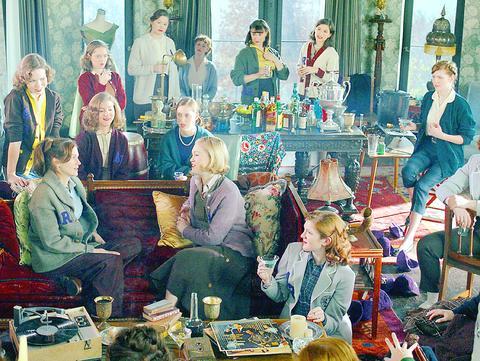"You can bake your cake and eat it too!" says the reassuring slogan that distills the comfy revisionist feminism informing Mona Lisa Smile. That slogan is repeated empathically enough to qualify as the defining mantra of a movie that pretends to be audacious. And the lurking duplicity in that loaded word "bake" (remember Hillary Rodham Clinton's sarcastic remarks about baking cookies?) winds up applying to the movie itself. Like Down With Love earlier this year, Mona Lisa Smile preaches disruptive female self-empowerment out of one side of its mouth while out of the other it invokes the dream of being swept up, up and away by Prince Charming.
A miscast but irresistible Julia Roberts stars as Katherine Watson, a free-spirited Californian who moves East to teach at demure, snooty Wellesley College in 1953 and shakes up the place enough to be deemed subversive by the institution's hawk-eyed thought police. The insistence with which Katherine presses her mildly progressive agenda at the elite women's college makes her a kind of academic Erin Brockovich, or so the movie wants us to believe. And in her art history classes, which inspire the screenplay's most intelligent writing, she challenges her students to do more than simply identify paintings shown in slides.

PHOTO COURTESY OF BVI
"Why is an original van Gogh a work of art and a reproduction not?" she asks. And where does a do-it-yourself, paint-by-numbers van Gogh fit into the scheme of things? The early 1950s also brought the ascendance of Abstract Expressionism, and the appearance of a Jackson Pollock canvas on campus stirs up ripples of controversy.

PHOTO COURTESY OF BVI
But Katherine's biggest boo-boo has nothing to do with notions of aesthetics. Arriving at Wellesley, she is appalled to discover that almost to a person, her brilliant, privileged students have no postgraduate ambitions beyond settling down with Mr. Right, having babies and baking sugar cakes for hubby. Her rebellion culminates with an indignant, heretical slide show of vintage magazine ads displaying perky, smiling Stepford wives reigning like queens in their immaculate kitchens.
The movie was directed by Mike Newell, whose popular films Four Weddings and a Funeral and Enchanted April tease you with the same glimmerings of something loftier before settling into a warm and fuzzy niche. Like his fellow Briton Richard Curtis (Love, Actually, Bridget Jones's Diary, Notting Hill and the screenplay of Four Weddings), Newell is master of the feel-good ensemble piece whose shallowness is partly masked by the expertise of a high-toned cast.
A star-watcher's guilty pleasure, the movie rubs together three of Hollywood's brightest younger stars -- Kirsten Dunst, Julia Stiles and Maggie Gyllenhaal, all playing Wellesley seniors -- and throws in an appealing newcomer, Ginnifer Goodwin. Topping off this marshmallow sundae are vivid turns by Marcia Gay Harden as the world's prissiest (and weepiest) teacher of elocution and poise, Juliet Stevenson as the discreetly lesbian school nurse with progressive ideas about birth control, and that empress of hauteur, Marian Seldes, playing the intransigently starchy college president. Dominic West, as a carnivorous-eyed professor of Italian who sleeps with his students, gives the movie its requisite shot of testosterone.
If Roberts is the undisputed star of Mona Lisa Smile, she graciously allows her acolytes plenty of opportunity to sparkle. Each plays a specific type. Dunst is Betty Warren, a vicious, overprivileged alpha girl and archtraditionalist hellbent on marriage to a louse, who attacks Katherine in the college newspaper.
Stiles is Joan Brandwyn, Betty's best friend and Katherine's protege, who finds herself torn between marriage and Yale Law School. Gyllenhaal, who almost steals the movie, plays Giselle Levy, the wised-up class rebel who sleeps around and almost loses her bearings. Goodwin's character, Connie Baker, is the house wallflower (and chief victim of Betty's cruelty) who can't believe it when a boy asks her out. Although the four are stock figures, the talented actresses shade their stereotypes enough to lend them as much humanity as the formulaic screenplay (by Lawrence Konner and Mark Rosenthal) permits.
As the story follows Katherine through her first year at Wellesley, there are enough reversals to keep you guessing which characters will escape this upscale cuckoo's nest, although it's not very hard to figure out. Although Roberts is playing a grown-up academic, the aura she wafts is as ingenuous as ever. She is still the wide-eyed but feisty people's princess and angel of common sense whose high-beam smile can melt steel.

May 18 to May 24 Pastor Yang Hsu’s (楊煦) congregation was shocked upon seeing the land he chose to build his orphanage. It was surrounded by mountains on three sides, and the only way to access it was to cross a river by foot. The soil was poor due to runoff, and large rocks strewn across the plot prevented much from growing. In addition, there was no running water or electricity. But it was all Yang could afford. He and his Indigenous Atayal wife Lin Feng-ying (林鳳英) had already been caring for 24 orphans in their home, and they were in

On May 2, Chinese Nationalist Party (KMT) Chairman Eric Chu (朱立倫), at a meeting in support of Taipei city councilors at party headquarters, compared President William Lai (賴清德) to Hitler. Chu claimed that unlike any other democracy worldwide in history, no other leader was rooting out opposing parties like Lai and the Democratic Progressive Party (DPP). That his statements are wildly inaccurate was not the point. It was a rallying cry, not a history lesson. This was intentional to provoke the international diplomatic community into a response, which was promptly provided. Both the German and Israeli offices issued statements on Facebook

President William Lai (賴清德) yesterday delivered an address marking the first anniversary of his presidency. In the speech, Lai affirmed Taiwan’s global role in technology, trade and security. He announced economic and national security initiatives, and emphasized democratic values and cross-party cooperation. The following is the full text of his speech: Yesterday, outside of Beida Elementary School in New Taipei City’s Sanxia District (三峽), there was a major traffic accident that, sadly, claimed several lives and resulted in multiple injuries. The Executive Yuan immediately formed a task force, and last night I personally visited the victims in hospital. Central government agencies and the

Australia’s ABC last week published a piece on the recall campaign. The article emphasized the divisions in Taiwanese society and blamed the recall for worsening them. It quotes a supporter of the Taiwan People’s Party (TPP) as saying “I’m 43 years old, born and raised here, and I’ve never seen the country this divided in my entire life.” Apparently, as an adult, she slept through the post-election violence in 2000 and 2004 by the Chinese Nationalist Party (KMT), the veiled coup threats by the military when Chen Shui-bian (陳水扁) became president, the 2006 Red Shirt protests against him ginned up by